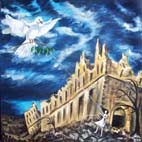I have heard veterans speak with a little bitterness about returning home to a changed society, expected to fit in, and having to be taught by younger men who were at school while the soldiers were in the battlefield. Those at "home" had work, earned salaries, and had moved ahead while the returned soldiers came home without work, having been paid only a small allowance while they were away, and had to find their way back into a society that did not understand what they had been through. For some, having experienced trauma, and seen sights that no young person should ever have to see, they then had to take instruction and correction from "school kids".
One veteran said "We couldn't talk about it. You don't want your wife and children to know how terrible it was. Only the returned soldiers from the First World War had any idea of what we had been through. And you felt guilty that you had survived. When you saw someone who had lost their sons, you couldn't look at them. You didn't want to be there. It wasn't easy, coming home".
That there is still a huge legacy from this war in New Zealand is evidenced by the requests artists have had. Margaret Piggott writes:
".The Maori connection... I painted the transition of the soul after death, announced by fantails and passing through the Pohutakawa tree and along the land to Cape Reinga where it then goes through the roots of the Pohutakawa to the legendary "Hawaiki" I painted a portrait of Teresa with her whakapapa down the side. This work is not for sale. When she heard about this exhibition she insisted that this painting be shown as a tribute to her late father, who fought in Cassino and was a sniper in the Maori Battalion. He stands behind her. He was one of the youngest, having lied about his age and was so quick on his feet that he returned. Most snipers didn't. ... Teresa has many relatives who are watching this exhibition with interest and see it as an ideal way to remember fallen loved ones and those who fought so bravely and returned to a different society. A different kind of battle."
Artists, by sharing your stories, and talking with family and veterans, you are providing a much needed service in our country. We remember those who fell, but too often we forget that those who survived have been carrying a huge amount of grief, dreaming horrific images, and left alone to deal with a past that needs to be faced and put to rest, not buried inside them where it remains a sorrowful burden.
Merv Appleton's painting for Wattie McEwen (presentation recorded by TV3) must surely be one of the treasures that has come from this exhibition. I understand that the painting below is the one that moved the veteran to share with Merv the story of finding his brother's grave.













No comments:
Post a Comment